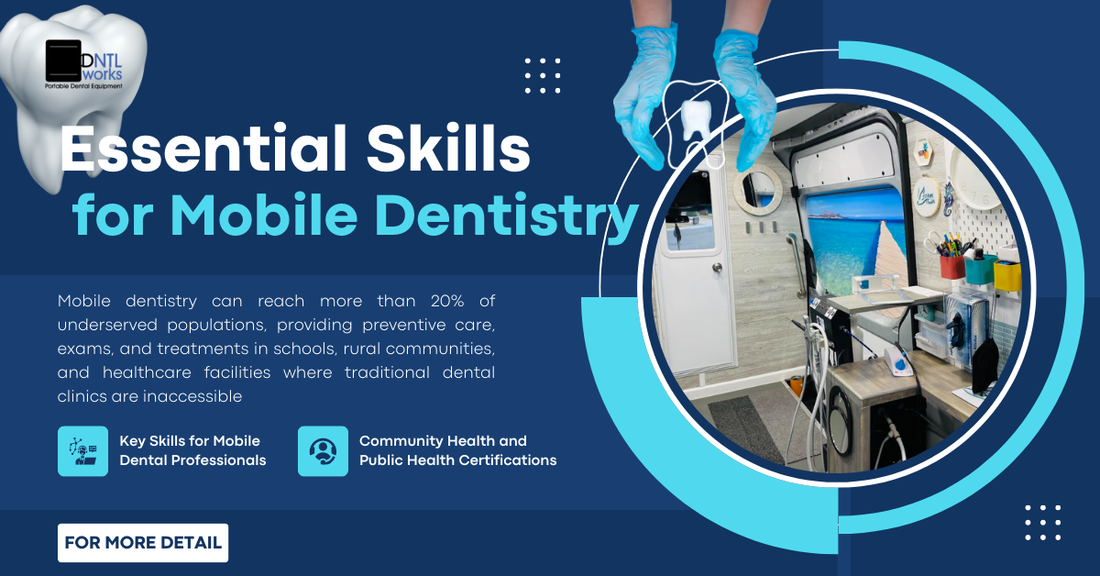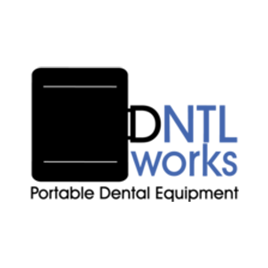
Essential Skills and Training for Mobile Dentistry
Share
Mobile dentistry is expanding access to quality dental care in ways that traditional practices often cannot, reaching underserved communities, rural areas, schools, and more. However, mobile dentistry requires a unique skill set, specialized training, and the ability to adapt to a variety of environments. In this guide, we’ll explore the essential skills, training opportunities, and best practices to ensure your success in mobile dentistry.
Why Specialized Training Matters in Mobile Dentistry
Unlike traditional dental practices, mobile dentistry involves delivering services in non-traditional settings with portable equipment and limited resources. Adapting to these unique challenges requires specific skills and knowledge, including proficiency in mobile equipment, effective patient communication, and community outreach strategies.
Did You Know? Mobile dentistry can reach more than 20% of underserved populations, providing preventive care, exams, and treatments in schools, rural communities, and healthcare facilities where traditional dental clinics are inaccessible.
1. Key Skills for Mobile Dental Professionals
Successful mobile dentistry requires both clinical and soft skills to provide effective care outside of a traditional office. Here are some of the essential skills every mobile dental professional should develop:
| Skill | Description | Why It’s Important |
|---|---|---|
| Portable Equipment Proficiency | Understanding setup, operation, and maintenance of portable dental units | Ensures seamless patient care and minimizes equipment downtime |
| Adaptability and Flexibility | Ability to adjust to diverse settings and patient needs | Enhances patient satisfaction and optimizes care in various environments |
| Community Health Education | Providing preventive care advice and oral health education | Empowers patients to take control of their oral health |
| Cross-Cultural Communication | Effective communication with patients from diverse backgrounds | Builds trust and helps deliver more personalized care |
| Time Management | Efficiently managing appointments, setup, and teardown times | Enables serving more patients and reduces wait times |
2. Recommended Training and Certification Programs
Gaining specialized training and certifications in mobile dentistry will build your skills and enhance your practice. Here are some of the most valuable training options:
Community Health and Public Health Certifications
Courses in community health, such as the Certified Public Health Dentist (CPHD) or similar certifications, provide an in-depth understanding of health disparities, cultural competency, and effective outreach strategies for mobile settings.
Continuing Education in Portable Equipment Use
Many professional organizations, such as the American Dental Association (ADA) and National Mobile & Teledentistry Conference, offer CE courses focused on portable equipment and mobile practice management. These courses cover proper usage, troubleshooting, and maintenance of mobile units.
On-the-Job Training and Volunteering
Gaining hands-on experience through volunteer work or internships in mobile dentistry can be invaluable. Look for local outreach programs, school-based dental programs, or nonprofit organizations that allow you to practice in a mobile environment and learn directly from experienced professionals.
Training Options for Mobile Dentists
Insight: A combination of certifications, hands-on experience, and CE courses provides the most comprehensive training for mobile dentistry, equipping professionals to adapt to diverse environments and patient needs.
3. Patient Care in Non-Traditional Settings
Providing dental care outside a typical office setting presents unique challenges. Mobile dental professionals need to prioritize patient comfort, effectively communicate treatment plans, and ensure that care is tailored to the environment and patient demographic.
- Explain Procedures: Many mobile dentistry patients are unfamiliar with dental procedures, so explaining each step can ease anxiety and build trust.
- Offer Comfort Items: Bring portable items such as neck pillows or headphones to help patients relax during their treatment.
- Focus on Preventive Care: Emphasize the importance of brushing, flossing, and regular check-ups, especially if patients have limited access to dental care.
4. Technical Skills for Operating Mobile Equipment
Portable equipment proficiency is essential for mobile dental professionals. Knowing how to set up, operate, and troubleshoot your mobile unit will ensure smooth operations and reduce downtime. Key technical skills include:
- Power Management: Understanding power requirements and backup options for portable equipment is critical in locations with limited or unreliable power sources.
- Maintenance Skills: Regular cleaning, filter replacement, and calibration of equipment are necessary to keep units in optimal working condition.
- Troubleshooting Techniques: From fixing minor leaks to resolving suction issues, quick troubleshooting skills are essential for mobile settings.
Common Troubleshooting Steps for Portable Dental Equipment
Takeaway: Basic troubleshooting skills like checking power sources, inspecting connections, and cleaning filters help mobile dental professionals provide uninterrupted care and ensure equipment reliability.
5. Building Trust and Rapport with Community Partners
Establishing relationships with community organizations and local leaders is essential for building a sustainable mobile practice. Partnerships with schools, nursing homes, and community health centers provide access to populations in need of dental care.
Tip: Attend local health fairs, offer free screenings, and host educational sessions to strengthen your presence and build a positive reputation in the community.
6. Continuing Education: Staying Updated on Mobile Dentistry Trends
Dental technology and patient care standards are constantly evolving. Continuing education (CE) is crucial for staying updated with best practices in mobile dentistry. Here are a few sources for CE courses and industry updates:
- ADA and Local Dental Associations: Many dental associations offer CE courses focused on mobile practice, public health, and portable equipment.
- Mobile Dentistry Conferences: Conferences dedicated to mobile and teledentistry provide hands-on workshops, lectures, and networking opportunities.
-
Online Courses: Platforms like DentalPost and CE Zoom offer online courses on various mobile dentistry topics, allowing you to learn at your own pace and stay current with industry trends.
Continuing education not only helps you stay informed about new developments in mobile dentistry but also strengthens your skills and enhances your credibility with patients and community partners.
7. Best Practices for Effective Mobile Dentistry
Applying what you’ve learned through training and experience is key to building a successful mobile practice. Here are some best practices to ensure that your mobile dental services run smoothly and effectively:
- Develop a Pre-Visit Checklist: Keep a checklist for all necessary equipment, supplies, and tools to ensure you’re fully prepared for each location and patient group.
- Prioritize Patient Education: Use each visit as an opportunity to educate patients about preventive care practices, especially in communities with limited access to regular dental services.
- Optimize Equipment Maintenance: Establish a regular maintenance schedule to keep your portable equipment in top working condition, reducing the risk of breakdowns during patient care.
- Adapt Your Setup to Each Location: Be prepared to modify your workspace and workflow based on the environment, such as a school gym, senior center, or outdoor health fair.
- Network with Other Mobile Professionals: Connecting with other mobile dental providers can help you share insights, troubleshoot challenges, and stay motivated.
Conclusion
Mobile dentistry is an exciting, impactful field that allows dental professionals to expand access to care and make a difference in diverse communities. By focusing on specialized training, essential skills, and best practices, you can build a thriving mobile practice that provides quality care to underserved populations. Keep developing your skills, building community connections, and following best practices to ensure a successful and rewarding career in mobile dentistry.
Looking for more resources? Follow our blog for additional insights on mobile dental care, equipment guides, and industry updates!
